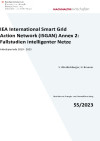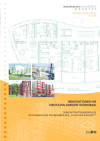Suchergebnisse für "Factsheet%3A Energietechnologien gestalten%2C die f%C3%BCr alle sinnvoll und nutzbar sind"
IEA - Netzwerktreffen
24. November 2009, 9:30 bis 17:00 Uhr
Gartenhotel Altmannsdorf, 1120 Wien
IEA International Smart Grid Action Network (ISGAN) Annex 2: Fallstudien intelligenter Netze (Arbeitsperiode 2019 - 2023)

Das Hauptziel dieser Arbeitsgruppe des International Smart Grid Action Netzwerks (ISGAN) ist es, allen relevanten Stakeholdern Zugang zu detaillierten Informationen über den aktuellen Status von Pilot- und Demonstrationsprojekten für intelligente Stromnetze zur Verfügung zu stellen.
Schriftenreihe
55/2023
S. Windischberger, H. Brunner
Herausgeber: BMK
Deutsch, 31 Seiten
Downloads zur Publikation
IEA AFC Annex 35: Steam reforming of bioethanol-gasoline mixtures (2018)

Dieser Abstract befasst sich mit der Reformierung von E85 Bioethanol zur Erzeugung von Synthesegas.
D. Ladenhaufen, K. Malli, V. Hacker
Herausgeber: Graz University of Technology, S. 27-28
Englisch
Downloads zur Publikation
Posterpräsentation bei "SETAC Europe 12th Annual Meeting"
12-16 May 2002
Vienna, Austria
Challenges in Environmental Risk Assessment and Modelling: Linking Basic and Applied Research Titel: Produktbezogene Umweltinformationssysteme (PUIS) in österreichischen Unternehmen Autorin: DI Dr. Uli Seebacher, IFF/IFZ - Interuniversitäres Forschungszentrum für Technik, Arbeit und Kultur
IEA-DSM Spotlight-Newsletter #64, März 2017

Der Themenfokus des Newsletter liegt auf dem Nutzen von Verhaltensänderungen, der Wirtschaftlichkeit von Gebäudenachrüstungen sowie der Schweizer Energiestrategie 2050
Herausgeber: IEA DSM
Englisch, 7 Seiten
Downloads zur Publikation
IEA Bioenergy: Österreich Newsletter November 2021
In der vierten Ausgabe des Newsletters werden Highlights aus den österreichischen Beteiligungen an den Tasks des IEA Bioenergy Netzwerkes vorgestellt sowie Projekte, Veröffentlichungen und Veranstaltungen präsentiert.
IEA Bioenergy Task 39: Newsletter, Ausgabe 56, Dezember 2020

Der Schwerpunkt dieser Ausgabe liegt auf einem Artikel zum Thema „India Biofuel economy roadmap – Challenges & Prospects“.
Mahmood Ebadian, Jack Saddler, Jim McMillan
Herausgeber: IEA Bioenergy Task 39, 2020
Englisch, 23 Seiten
Downloads zur Publikation
ÖGUT Umweltpreis 2015 - Kategorie "Stadt der Zukunft" (Einreichschluss 21. September 2015)
Mit Unterstützung des BMVIT werden heuer in der Kategorie "Stadt der Zukunft" erstmals herausragende Personen (nicht Projekte) aus dem Themenfeld "Energie- und Gebäudetechnologien mit Stadtbezug" gesucht, um sie mit dem Umweltpreis 2015 auszuzeichnen.
Umfassende Modernisierung eines Gründerzeithauses mit EnerPHit-Zertifikat ausgezeichnet
Das "Stadt der Zukunft"-Demonstrationsprojekt, welches trotz strengen Anforderungen des Denkmalschutzes eine Energieeinsparung von 85 Prozent gegenüber dem ursprünglichen Zustand erreicht, wurde mit dem EnerPHit-Zertifikat des Passivhaus Institutes sowie mit dem Wiener Stadterneuerungspreis 2018 ausgezeichnet.
Nachhaltige Regionalplanung In Österreich

Das Projekt Ökofit - Forschung für integrierte Technik
Forschungsforum
4/1996
Herausgeber: BMVIT
Deutsch, 6 Seiten
Downloads zur Publikation
Workshop: Neue Wege zur ökologischen Sanierung
23. Jan 2008
hiz holz innovations zentrum
Zeltweg, AT
Workshop für Baufachleute
Kontakt
CEPHEUS-Austria: Mehrfamilienhaus Salzburg-Gnigl (Salzburg)
2-geschossiges Gebäude mit 2 Maisonette-Wohnungenund 4 Garconnieren (sozialer Wohnbau) in Passivhaus-Bauweise im Rahmen des CEPHEUS-Projektes zur Schaffung eines europäischen Standards für kosteneffiziente Passivhäuser
Entwicklung einer Passivhaus- Außentüre

Entwicklung eines "passivhaustauglichen" in Serienproduktion herstellbaren Außentürsystems.
Mehrsprachig
Ausstellung: Baufamilien-Tag
30. Aug 2009
1. Europäisches Passivhausdorf zum Probewohnen
3922, Großschönau, AT
Der Sonnenplatz Großschönau veranstaltet am 30. August 2009 erneut einen Baufamilien Tag. Dieses Mal zu den Schwerpunktthemen "Photovoltaik, Solaranlagen sowie Ökologische Baustoffe".
EGRD Workshop-Berichte
Der Bericht des Workshop "Space Cooling" vom Mai 2016 wurde veröffentlicht.
Programme of Work IEA-ISGAN Annex 6: Power T&D Systems, Issue 4.0

Das Dokument stellt das Arbeitsprogramm des IEA-ISGAN Annex 6 in Version 4 dar. Es wurde im Oktober 2014 vom ISGAN ExCo genehmigt.
Parabolrinnenkollektor für industrielle Prozesswärme
Im Rahmen eines Projektes der Programmlinie "Fabrik der Zukunft" des BMVIT wurde einkostengünstiger konzentrierender Kollektor mit kleinen Abmessungen nach dem Parabolrinnenprinzip entwickelt.
Green Energy Lab
Green Energy Lab ist eine Forschungsinitiative für nachhaltige Energielösungen, darunter auch im Gebäudebereich, sei es im Austausch von Ideen, bei der Entwicklung neuer Technologien oder der Erprobung innovativer Geschäftsmodelle.
